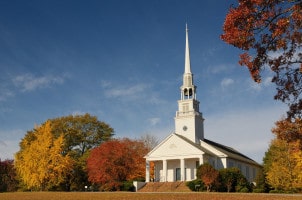
Can you imagine an American town where people have no place to worship? If not for RLUIPA, a little known law celebrating its 15th anniversary this year, communities throughout this nation would be living that very reality. It’s a piece of legislation that protects churches, temples, mosques and synagogues from the tax-based prejudices of revenue-hungry cities and towns. And our country is a better place because it exists.
For nearly 225 years, one of the great hallmarks of this country has been the freedom to gather and worship without governmental influence or interference. We almost lost that freedom in 1990 when a United States Supreme Court decision allowed local governments to block new houses of worship.
Seven years and nine hearings later, Congress determined it necessary to pass an additional law to address the areas in which the ensuing religious discrimination had become most prevalent: laws governing institutionalized persons (i.e., prisoners and persons in mental institutions) and land use laws. Thus, the Religious Land Use and Institutionalized Persons Act (RLUIPA) was proposed and enacted with overwhelming bipartisan support. It passed both the House and Senate by unanimous consent and was signed into law by President Clinton on September 22, 2000.
Fast forward 15 years, and we can say RLUIPA is one of the most significant laws ever passed by Congress. It directly impacts millions of Americans every day, providing critical protections for religious freedom. Its land use provisions have allowed houses of worship to open and remain open across the nation, escaping discriminatory or substantially burdensome land use restrictions. The impact is pervasive and the examples are many.
Christians are worshiping today in a former warehouse that once sat idle in a fully developed New Jersey neighborhood. The community tried to stop the church from converting the space to a tax-exempt property and only allowed the use when the town was made aware of RLUIPA.
Elsewhere on the East Coast, Muslims practice their faith in a mosque housed in what had been a defunct banquet center. An angry group of adjacent property owners tried to stop the redevelopment, but litigation under RLUIPA allowed the mosque to be built.
Students of an all-girls catholic high school in southern California today have the space and the technology necessary for a high quality education and advancement of the school’s religious mission. The city denied the school the ability to renovate its own campus, but a lengthy RLUIPA trial determined the municipality acted unfairly and awarded the school the permits and other support it needed to proceed.
Churchgoers in a Florida city have hope today that they too will be able to worship in their own community. The city denied the church the ability to build on vacant land the church had purchased, but allowed a private school to open in the same zoning district. A court determined the city’s actions to be in violation of RLUIPA.
Despite recent administrative and judicial limitations, the one balancing point of the freedom to assemble in houses of worship is alive and well in this country today because of RLUIPA.
And houses of worship matter.
They quite literally bring us together and help us develop the relationships that create meaning in our lives. That is invaluable and desperately needed in a busy and often lonely world where communication technologies from smart phones to Snapchat help us stay connected, but somehow drive us farther and farther apart. That is why we see new churches fill up quickly from New York to Los Angeles.
Let us celebrate religious freedom by remembering the hard fought battles that ensure all religious groups can worship freely in the United States. And let us thank those who have the wisdom and the foresight to challenge local governments that discriminate against religious groups by precluding houses of worship.
Land use and zoning attorney Daniel P. Dalton is co-founder of Detroit-based Dalton & Tomich, PLC. He is the author of “Litigating Religious Land Use Cases”, published by the American Bar Association.

